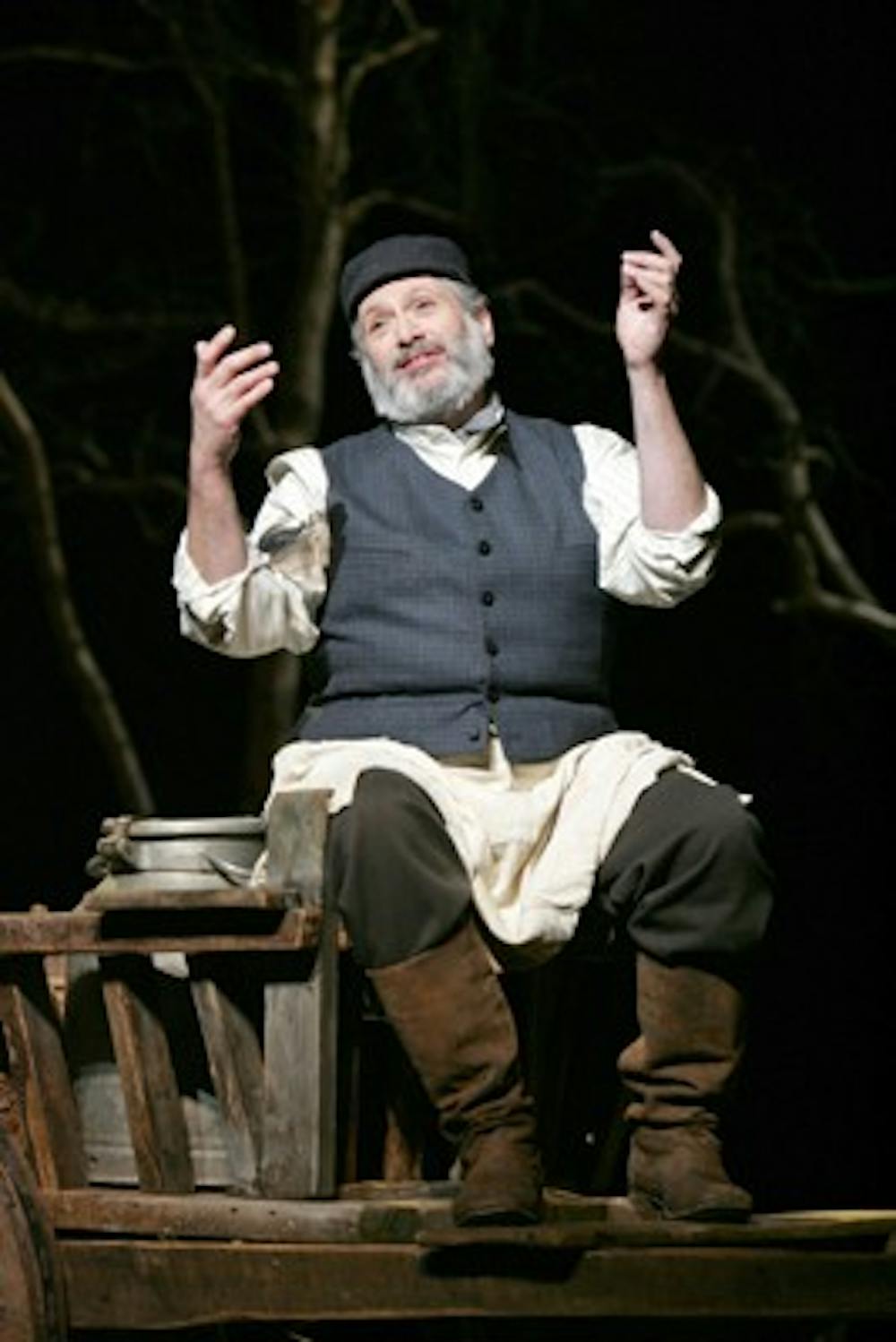Correction Appended
When playing a part as beloved, well-known and demanding as Tevye in “Fiddler on the Roof,” there are definite dos and don’ts. It is important not to subtract from the character that has given it universal appeal. Tevye is such a cultural icon that it is of paramount importance that he remain recognizable. On the other hand, a large part of what makes Tevye so beloved in the first place is that those who have played him (Topol and Zero Mostel) have imbued the character with so much of themselves. It is important that the part be distinct and reflect the actor, with neither the role nor the player overwhelming the other.
Harvey Fierstein’s Tevye strikes a perfect balance between these two contradicting necessities. Fierstein is a theatrical institution, and gets what turns out to be a well-deserved first billing. Having played Teyve numerous times in various cities through the years, Fierstein is able to simultaneously inhabit both his legendary role and his oversized stage personality. He adds a lot of himself to the character, enhancing Tevye rather than suffocating him.
In his comedic scenes, Fierstein leaves room for improvisation. Much of the time he moves and talks calmly, slowly teasing the laughs out of the audience with a look or gesture. Sometimes, however, he explodes with energy, delighting the crowd. By the end of the first scene, the audience was eating out of Fierstein’s hand. There was no eyebrow raise or ironic aside incapable of getting a thunderous peal of laughter. Every so often, Fierstein would throw in a wink-wink, “Hey, it’s me Harvey!” moment where he would jump out of character with an unmistakable falsetto kvetch. He would then leap back into character before anyone watching could realize what had happened, leaving the audience with the merest flash of recognition that he was acknowledging their appreciation.
The dramatic scenes posed more of a challenge than the comedic ones. It’s hard for Fierstein to make the audience feel his paternal authority, but it’s excusable because Tevye’s loss of that authority is a theme within the play. At the moment where it’s most crucial for him to project gravitas — when the Constable (played well by Stephen Lee Anderson) comes to Tevye’s house to inform him and the rest of the village of Anatevka that they must leave their homes within three days — Fierstein is able. During this climactic confrontation, he intelligently opts for a low rumble over his high-pitched squawk (which the audience knew from watching his attempts to control his daughters for the previous two hours is not going to make anyone do anything).
If there is a complaint to be had with this play, it’s that it doesn’t make the most of its opportunities for sentiment. While “Fiddler” is remembered for its exuberance and humor, some of its best scenes and songs are unapologetic tearjerkers (“Far From the Home I Love” and “Chavala” are the two best examples). Many of these secondary numbers felt rushed or cursory, including, unfortunately, “Now I Have Everything” and “Miracle of Miracles.” And while most of the supporting cast and ensemble was excellent, the first two husbands, Motel (played by Zal Owen) and Perchick (Colby Foytik) were unremarkable. In contrast to Fierstein, they didn’t invest anything of themselves in the role, letting the audiences’ memories and associations with the part fill in the gaps in their performance.
Nevertheless, Fydka, with the smallest part amongst the trio of suitors, managed to distinguish himself, adding character to the role. The parts of the daughters were also all well performed, if not as memorable as that of Susan Cella’s as Golde. It is often said that the show belongs to Tevye, but a strong Golde is an essential counterweight for an exceptional, or even adequate, show. Cella’s Golde transcends the role of foil for her husband and becomes a compelling character in her own right.
The ensemble came together stupendously and the play was supported by a powerful and accommodating pit conducted by David Andrew Rodgers to create a tremendous show. The most crucial dancing scenes, “To Life” and “The Bottle Dance,” were two of the highlights of the show. It very rarely got tiresome (an exception was the gratuitous wedding scene). And, importantly, for a show with a reputation for family-friendliness, the entire audience was on board.
You can reach this writer at thescene@theeagleonline.com.
Correction: An earlier version of this article's photo caption incorrectly stated that "Fiddler on the Roof" runs through May 9. The show runs through May 2. This version has been corrected.





